Fantasy, The Middle-East, and a Conversation with Saladin Ahmed
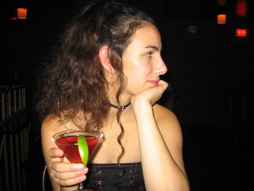 Hi! My name’s Amal! We’ve never met. Well, unless we have. But most likely we haven’t, because I’ve never blogged here before, even though Ms. Claire Rides-the-Lightning Cooney has mentioned me in my capacity as one of the Editors of Goblin Fruit in her ever-so-mighty three-part article extravaganza about mine humble ‘zine.
Hi! My name’s Amal! We’ve never met. Well, unless we have. But most likely we haven’t, because I’ve never blogged here before, even though Ms. Claire Rides-the-Lightning Cooney has mentioned me in my capacity as one of the Editors of Goblin Fruit in her ever-so-mighty three-part article extravaganza about mine humble ‘zine.
Anyway, towards summer’s end, Claire Too-Sexy-For-Trousers Cooney told me about a conversation our very own scurrilous blarneyful dear John O’Neill had with some friends, in which they were trying to think of Muslim SF writers, and coming up blank. Then someone thought of me! My vanity, it was flattered!
Except, I am not Muslim.
I am, however, a first-generation Lebanese-Canadian, and that may as well be the same thing.
Over the last nine years, I’ve had occasion to be startled, and then to cease to be startled, by the extent to which my Middle-Eastern-ness gets conflated with Muslim-ness as a matter of course, as well as the extent to which people feel entitled to learning my religion along with my name. This is not the space in which I want to think about why precisely that is – I have a blog too, after all – but it is the space which Ms. Awesomesauce Cooney offered me to talk about the ways in which we might see the Middle-East positively represented in fantasy, as well as showcase a writer of fantasy literature who does in fact happen to be Muslim.
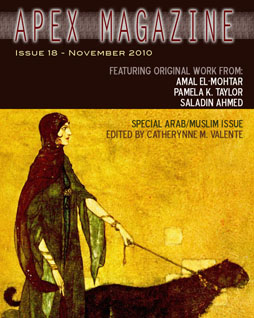 So, first and foremost, I would like to tell you about the November Issue of Apex, also called the Arab/Muslim issue, with original work by Pamela K. Taylor, Saladin Ahmed, Samer Rabadi, Jawad Elhusuni, and Sara Saab. This was editor Catherynne M. Valente’s response to Elizabeth Moon’s “Citizenship” post, and it’s pretty freakin’ awesome — so freakin’ awesome that, in spite of having a story in the issue myself, I decided I needed to write an essay cataloguing the ways in which the issue is awesome. Here be the gist:
So, first and foremost, I would like to tell you about the November Issue of Apex, also called the Arab/Muslim issue, with original work by Pamela K. Taylor, Saladin Ahmed, Samer Rabadi, Jawad Elhusuni, and Sara Saab. This was editor Catherynne M. Valente’s response to Elizabeth Moon’s “Citizenship” post, and it’s pretty freakin’ awesome — so freakin’ awesome that, in spite of having a story in the issue myself, I decided I needed to write an essay cataloguing the ways in which the issue is awesome. Here be the gist:
Everything in this issue is engaging with the authority of texts, undermining and re-asserting and deconstructing that authority in a number of ways. Of the original fiction offerings, one story is told in the decaying fragments of a copy of a text, this copy itself framed by an authoritative catalogue description; one is a story illuminated by citations of a text interpreting Scripture, the most authoritative text there is; one is a story guided by text granted authority through its inscrutability, through its randomness, through the decay of textual coherence and authority.
Authority. We has it. Also devout Muslim vampires, a dystopic SF retelling of a Middle-Eastern folktale, and a woman who’s a book. So I think you should check it out.
Next, Claire Stumps-the-Sea-King Cooney has insisted that I also talk about a story of mine called “And Their Lips Rang with the Sun.” My representations of the Middle-East tend to be more informed by my experience of language and landscape than anything else: Arabic was my first language growing up, but is the language I speak with least ease now, is almost an artefact I need to excavate from within layers of myself whenever I want to communicate. It was very much in that way that I unearthed a memory of learning about Sun Letters and Moon Letters in the Arabic alphabet, and decided to write them a story.
Where landscape is concerned, well. I have this thing about writing love songs to Damascus. Cooney knows all about it. Ask her sometime. Or — dammit, she and her thunder-combing person-prodding ways! Okay, so I wrote a poem called “Song for an Ancient City” and Mike Allen published it in Mythic Delirium and it won the Rhysling Award and my dad loved it so much he translated it to Arabic and it got published in a Syrian journal called Fikr and this was kind of a huge, huge deal to me and you should look at it.
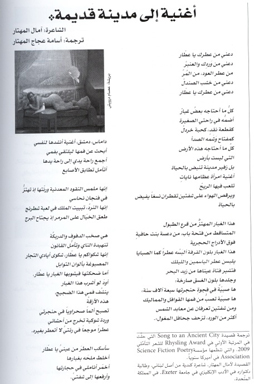 Cool, no? And now I’d like to tell you about Saladin Ahmed.
Cool, no? And now I’d like to tell you about Saladin Ahmed.
I first heard of Saladin while Mike Allen was putting together the second volume of his wonderful Clockwork Phoenix anthology series (which you should totally check out, because it is awesome). Saladin had a story in it, called “Hooves and the Hovel of Abdel Jameela,” which went on to become a finalist for the Nebula award. Since then he’s sold a novel to DAW and been nominated for the John W. Campbell Award for Best New Writer, and I am still kicking myself for not having introduced myself at last year’s Readercon, when I glimpsed him across a crowded hallway, since now I’ll have to wait until after he’s all famous and stuff, and there will likely be a queue, and I am impatient.
Meantime, he was kind enough to agree to an interview, which follows.
A Conversation with Saladin Ahmed
Conducted and transcribed by Amal El-Mohtar
How, if at all, does being a Muslim Arab-American inflect your reading of fantasy literature?
Well, growing up, I guess I’ve long had a desperation to see some more variety in casts and settings. The unrelenting quasi-Euro-ness of secondary world fantasy never kept me from loving The Hobbit or The Last Unicorn or Dragonlance (which, to its credit, did at least have a couple of Black people in it). But on those occasions – say in the excellent D&D tie-in novel Curse of the Azure Bonds, or in Robert Jordan’s books – when I encountered pseudo-Arabs I certainly perked up in a new way and sort of felt like I’d found something I hadn’t quite realized I was looking for.
I totally hear that. I felt that way coming across words that were clearly borrowed from Arabic in works by J. R. R. Tolkien, and seeing a dark-skinned boy say “salaam” in Ender’s Game. I thought, hey, here is something that speaks to me, directly. It was a huge, huge deal for me at sixteen.
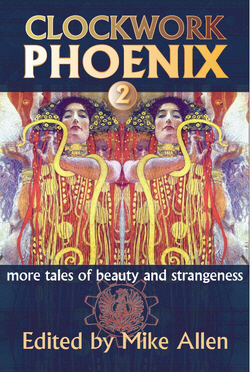 Of course, the… shall we say sophistication of those depictions is an open question. Fantasy novels tend to trade in archetypes. As a reader, that’s a big part of what I love about them: the taciturn swordsman, the spunky princess, the befuddled old wizard, the crazed priest of an ancient god.
Of course, the… shall we say sophistication of those depictions is an open question. Fantasy novels tend to trade in archetypes. As a reader, that’s a big part of what I love about them: the taciturn swordsman, the spunky princess, the befuddled old wizard, the crazed priest of an ancient god.
But archetypes are only a step removed, if that, from stereotypes. This is the case even when fantasy novels are dealing with Europe or pseudo-Europe. It’s even more the case when dealing with ‘other’ places and peoples, though, and often leads to reducing ‘Islam’ and ‘Arab’ to a stock set of signifiers – fanaticism, honor, violence, sexism, absolutism, scimitars, veils, turbans, and, above all, the harsh, unforgiving desert that produces a harsh, unforgiving people.
This is the case even when we’re dealing with a secondary world – if you’ve got a fantasy map at the beginning of the book, you can be pretty sure that, to the east of the Europe-ish landmass, there will be a big ol’ desert, and it will be inhabited by fierce, proud nomads who wear flowing robes and chop people’s heads off. This handful of central casting shtick is a stark contrast to history’s reality of remarkably varied Islamic cultures.
Does being a Muslim Arab-American inform your writing of fantasy literature, as well as your experience of being recognised as a writer of fantasy literature?
I should start by saying that, with very few exceptions, I’ve felt remarkably welcomed as a new fantasy writer. I’d like to believe that that the fact that I was nominated for a Nebula in my first year as a published writer says something about my skill, but it also says something about the field’s openness to new and underrepresented points of view.
I’ve got a heroic fantasy novel, Throne of the Crescent Moon, due out in early 2012 from DAW, and it will be interesting to see what happens with it. There’s an argument that says that epic fantasy novel readers – more so than readers of short fiction – are an ultraconservative lot. I think there’s some truth to this, but I think it’s equally true that the readership for epic fantasy also encompasses some of the most open-minded and imaginative readers out there. So, as I say, it will be interesting to see how the novel fares.
A lot of my work features Islamic or pseudo-Islamic settings and characters. Often these are the same familiar archetypes I just mentioned – the world-weary soldier, the implacable paladin, etc. – but reimagined in and thus transformed by a different cultural context. So I’d be a fool not to be conscious of the cultural baggage readers may be bringing – sometimes without knowing it – to my stories. But working around this just involves a sort of intensified version of a writer’s normal challenges: Creating a world readers want to spend time in. Writing characters they’ll care about and want to ‘hang out’ with. Doing so with a 1001 Nights-inspired fantasy is in many ways just a tougher version of these tasks.
In writing Throne of the Crescent Moon, did you set out deliberately to fill that desert-gap in the heroic fantasy maps? Without giving too much away, what’s it about?
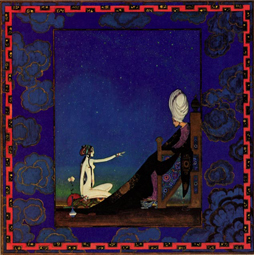 Throne is basically my attempt to gene-splice elements of the 1001 Nights with the tropes of heroic fantasy writers ranging from Fritz Leiber to Robert Jordan. The novel centers on a group of companions led by Doctor Adoulla Makhslood, “the last real ghul hunter in the great city of Dhamsawaat,” (and, incidentally, the protagonist of my first published story) who is more than ready to retire.
Throne is basically my attempt to gene-splice elements of the 1001 Nights with the tropes of heroic fantasy writers ranging from Fritz Leiber to Robert Jordan. The novel centers on a group of companions led by Doctor Adoulla Makhslood, “the last real ghul hunter in the great city of Dhamsawaat,” (and, incidentally, the protagonist of my first published story) who is more than ready to retire.
Adoulla, a fat old man who’s grown weary of chasing down monsters and saving lives, wants nothing more than to finally marry his old flame and spend his days sitting around his favorite teahouse. But a series of mysterious murders makes it clear that Adoulla’s beloved city still desperately needs his monster-hunting magics. To make things worse, Dhamsawaat is in the midst of a power struggle between the Khalif and a mysterious Robin Hood-type figure known as the Falcon Prince.
Adoulla and his uptight assistant, the holy warrior Raseed, soon learn that the murders and the political upheaval are connected. Adoulla, recruiting the help of old companions and new, discovers a sorcerous plot that threatens to turn his city and perhaps the world itself into a flaming, bloody ruin. And only he and his friends can stop this from happening.
I suppose that one of my many aims with Throne was to fill in the quasi-Middle East quadrant of the Generic Fat Fantasy Map, though the first book takes place largely within the city of Dhamsawaat (which is equal parts Lankhmar and Medieval Baghdad), rather than a desert. More than ‘filling in,’ though, I wanted to see what happens when we start with a different center for the fantasy map.I wanted to ask what happens when the ever-expanding scale of the heroic fantasy novel and its grand clash of armies treats quasi-Europe as the Great Threat on the Horizon.
So while the first book of The Crescent Moon Kingdoms Trilogy focuses on Dhamsawaat, books two and three will expand the world to truly epic scope, culminating in a Crusades-ish conflict that involves heroes and villains from both the East and the West.
For me, though, this isn’t a simple matter of ‘making the East good and the West bad’ – rather it involves interrogating the basic assumptions of heroic fantasy themselves: Is there such a thing as a good army or an evil army? Can a global war really make the world a better place? What should the decent people on either side of a conflict do when powerful men are manipulating events on a grand scale?
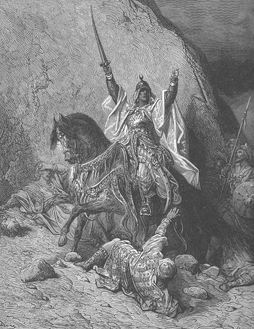 Of course, these are adventure fantasy novels, not a course in ethics. My chief aim with the Crescent Moon Kingdoms is entertainment. The questions above are always in the background, but the foreground is full of swordfights, magic, and monsters.
Of course, these are adventure fantasy novels, not a course in ethics. My chief aim with the Crescent Moon Kingdoms is entertainment. The questions above are always in the background, but the foreground is full of swordfights, magic, and monsters.
If you’re comfortable doing so, would you care to talk about encounters you’ve had with bigotry and racism, either personally or through general observation?
I’ve witnessed a fair amount of pretty grim anti-Arab/anti-Muslim bigotry in my life. Growing up, in pop culture I watched Chuck Norris and Schwarzenegger types blowing away Arabs onscreen. On the news I watched the media treat the mass killing of Arabs during Gulf War I like a video game. In real life I’ve experienced arson, threatening phone calls, intimidation from law enforcement, blatant discrimination in airports, etc, etc. I’ve frankly lost my capacity to be surprised by this kind of thing.
Even so, the past few years have shocked even me with the degree to which out-and-out bigotry has become an acceptable part of mainstream discourse in this country. For example, I recently wrote an article for the popular gaming magazine The Escapist on the depiction of Arabs and Muslims in video games, and – while I expected to deal with a certain amount of racist troll factor in the comments – I was kind of surprised at how quickly the conversation devolved to the level of ‘Well, DO Muslims deserve to be treated as human beings in video games?’ This wasn’t by any means a universal – a good 1/3 of the comments were supportive and open-minded. But it was prevalent enough to be depressing.
This sounds similar to some of the discourse surrounding Elizabeth Moon’s now-infamous post about the obligations of citizenship and the controversy surrounding the construction of the Park 51 Islamic community center, which led to her being disinvited as Guest of Honor at Wiscon 35.
However, it also led to Catherynne Valente deciding to dedicate an entire issue of Apex to showcasing work by Arab and Muslim writers, which led in turn to the happy instance of our becoming Table of Contents buddies for the first time! Hooray!
Any thoughts about the issue? Did you write “The Faithful Soldier, Prompted,” specifically for it? Tell me about the inspiration behind the story and the world in which it’s set.
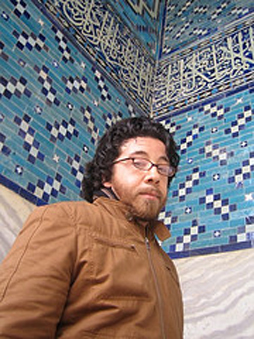 I think the whole issue is just amazing. Prior to Cat buying it, my story had actually made the submission rounds and couldn’t seem to find a home, in part, I suspect, because it’s essentially a theistic science fiction story.This is a bit of a spoiler (don’t follow the link if you haven’t read the story yet!), but it’s basically a dystopian version of a 1001 Nights story, the plot of which has appeared in folktales throughout the world. I haven’t written anything else set in the future that’s imagined in “Faithful Soldier,” but responses to the story have been enthusiastic enough that I’m tempted to…
I think the whole issue is just amazing. Prior to Cat buying it, my story had actually made the submission rounds and couldn’t seem to find a home, in part, I suspect, because it’s essentially a theistic science fiction story.This is a bit of a spoiler (don’t follow the link if you haven’t read the story yet!), but it’s basically a dystopian version of a 1001 Nights story, the plot of which has appeared in folktales throughout the world. I haven’t written anything else set in the future that’s imagined in “Faithful Soldier,” but responses to the story have been enthusiastic enough that I’m tempted to…
Here’s hoping! I adored that story even more than “Hooves and the Hovel of Abdel Jameela.” Where can we find more of your own work?
All of my short stories are available online for free – there’s a list of them here.
Thanks, Saladin! Looking forward to seeing you here again when the novel comes out!
[…] at Blackgate, Amal El-Mohtar talks about her Middle-East experience, and interviews Saladin Ahmed. Here’s an excerpt from her essay and interview respectively: […]
In relation to some previous posts, this is exactly why many of us don’t buy a lot of books from contemporary fantasy authors. I think my time would be better spent educating myself on the mass murder and oppression of Christians in Egypt, Iraq, and Pakistan, among other places than read a thinly veiled political tract.
I do agree, however, that the myths of non-Western cultures have much to offer fantasy literature. Chinese and Japanese myths have been incorporated successfully into many fictional settings. Maybe some enterprising young man or woman can write some stories influenced by Eastern Christian or Zoroastrian folklore, before their memory has been stamped from the Earth by their oppressors.
Amal, thank you for a wonderful look at one of the best new Fantasy writers around.
I’ve greatly enjoyed Saladin’s short fiction, and I’m really looking forward to his novel.
–Elizabeth Bear
Fantastic article, Amal! I’ve been beside myself with glee about Saladin’s novel since I heard about it this summer, and the links to his stories are now going directly into my Instapaper queue.
This, and the fabulous November issue of Apex, feel like real progress toward a much more interesting conversation about the world.
(Tyr, if your post wasn’t such a flailing, inept cartoon of racist piffle, I’d address your points. But it is.)
I first came across Hooves and the Hovel of Abdel Jameela over at Podcastle[Full disclosure: Podcastle’s forum moderator] when they ran it in May and really enjoyed it. I’m really looking forward to the novel, and Apex did a Good Thing with the November issue. I really look forward to reading it as soon as I can unbury myself from the slush pile.
–Bill
Tyr,
Self-education, in this instance, does seem like the most propitious course to take.
It is in the spirit of curiosity and wonder that Black Gate Magazine continues to celebrate new fantasy writing and the powerful new voices of the genre in this present century.
– Claire
Tyr:
I’m not sure I understand what you’re taking issue with — would you care to clarify? You seem to be saying that contemporary authors can write nothing but “thinly veiled political tracts,” at the same time that you express interest in educating yourself about real political problems; surely these are not mutually exclusive propositions, and fiction can be both entertaining and educational? You also seem to be suggesting that non-contemporary authors didn’t write “thinly veiled political tracts” — is this what you mean? That 1984 and Brave New World and Fahrenheit 451 are not books worth your time?
Further to which, you seem to imply that fiction influenced by, engaging with, or representing Christian folklore would NOT be “thinly veiled political tracts” — by virtue of being Christian? I confess myself confused. Surely C. S. Lewis’ Chronicles of Narnia are pretty thinly veiled?
That said, I would like to direct you towards Catherynne M. Valente’s The Habitation of the Blessed. Cat is an extremely enterprising young woman, and The Habitation of the Blessed is the first book in a trilogy with the story of Prester John at its heart. I sincerely hope you enjoy it, especially before the Eastern Christians are stamped out by the Western Christians so hell-bent on oppressing them.
Finally, thank you for demonstrating just how necessary this kind of post is on the Black Gate blog.
Elizabeth, Erin, Bill, Claire: y’all rock like cradles in prevailing winds. Thank you!
Amal, the point that has come up in several of the recent postings in this blog is that what fantasy fiction is in desperate need of is good adventure stories free of contemporary politics. There is no shortage of politically driven fiction of varying quality. While the Chronicles of Narnia, which you used in your example, is well written, I don’t consider it particularly good fantasy fiction since it is just a vehicle for a religious message. I’d be much more interested in and would probably buy well written fiction inspired by 1001 Nights that didn’t seek to serve as political instrument as well.
Finally, the claim of racism is spurious since my comments had nothing to do with ‘race’. The victims I mentioned are very often the same ethnicity as the people who have murdered them. The whine of Muslims claiming discrimination is wearying when you look at how minority religions fare in Muslim dominated countries.
Thank you for this informative interview! I especially appreciated Saladin’s comments about Muslim stereotypes in literature and remember something of these in my favorite book series of all time, Frank Herbert’s ‘Dune’. You might be interested to know that I read the books as a girl, and they were my first exposure to the word ‘jihad’. For many years, I thought it was a word he made up. Only in my early adulthood did I make connections between the culture he had borrowed from and the culture he had created.
I have wondered since about whether or not to include in my own fiction people from cultures I have little knowledge about. In the case of the novel I’m writing, I have decided to take the plunge and include two tertiary characters, a mother and daughter, who are both Middle Eastern and Muslim. I’ll be honest; I’m nervous about it. I ask myself ‘Is it all right if they wear veils? Make reference to their faith? Etc.? Will they be seen as stereotypes even though one is a matronly xenolinguist and the other is a very pretty, very compassionate girl who loves to garden?’
It’s hard to write multicultural fiction, to reach into that place where I know less than I want to and pull out believable characters that demonstrate some level of depth (though with tertiary characters, the level of depth required isn’t so great). When I feel like I’m skirting the edge of what I know, I err on the side of kindness, do some homework and cross my fingers.
I’ve heard it said that we shouldn’t write about the ‘other’ at all but only about those things we have direct cultural experience of. I don’t buy that, and I want for my writing to be multicultural, even if I have to work for it.
Anyway, thanks again. This interview came at a good time for my own creative process.
Amal, this is a wonderful piece. I’m happy to be associated with you here at Black Gate and although I hate ‘sharing’ my Wed art blog space with anyone *grin*, I’d do it again a hundred times if they had your talent and insight.
Well done! I hope to see more of you here.
Dear Scott,
Alas, mine is the responsibility for scheduling Amal’s blog post on a Wednesday!
Perhaps both your audiences will grow curious about what else is on the menu and scroll on over to check out ALL the Wednesday posts! Win for Black Gate!!!
Your art blog is great, by the way.
Regards,
Claire
Actually, the more I think about it, Herbert’s borrowing was more Middle Eastern than Islamic, wasn’t it? His religion was completely invented…
Claire,
Well, Amal and I must pair nicely because we’ve created the biggest day in Black Gate history, so that’s something 🙂
Best,
Scott
Did you?
Well now.
I just can’t say I’m surprised.
😀
Claire,
Setting aside the day in February when Boing Boing linked to the free short story we published online (“The Renunciation of the Crimes of Gharad the Undying,” by Alex Kreis), Scott is correct — this is the most traffic we’ve ever had.
In fact, it’s about 30% above the traffic we had on our previous record, earlier this month (also on a Wednesday).
Something about Art & Beauty, I imagine.
Holy Crow, I LOVE that short story!
“Renunciation” made me giggle ’til I gasped!
Art & Beauty, kickin’ butt and takin’ names since the days of Ishtar and the star on her forehead.
csmccath: So glad you enjoyed it! Point by point:
I especially appreciated Saladin’s comments about Muslim stereotypes in literature and remember something of these in my favorite book series of all time, Frank Herbert’s ‘Dune’.
To my shame and the detraction of my geek cred, I must confess to never having read Dune.
You might be interested to know that I read the books as a girl, and they were my first exposure to the word ‘jihad’.
I am interested to know that! My brother’s name is Jihad.
For many years, I thought it was a word he made up. Only in my early adulthood did I make connections between the culture he had borrowed from and the culture he had created.
And sadly, given the current political climate, few and far between are the people who know that “Jihad” is a religiously neutral name, one that you’ll find in Christian and Muslim families alike. It means “striving” or an internal aspect of “struggle” — for instance, in the Arabic Bible, Jesus is described as going through Jihad in the Garden of Gethsemane. Far, far removed from the “I’ma put a JEE-HAWD on you!” levels of understanding in America.
I have wondered since about whether or not to include in my own fiction people from cultures I have little knowledge about. In the case of the novel I’m writing, I have decided to take the plunge and include two tertiary characters, a mother and daughter, who are both Middle Eastern and Muslim.
Hooray! That’s awesome!
I’ll be honest; I’m nervous about it.
Perfectly understandable, and a good response, frankly.
I ask myself ‘Is it all right if they wear veils? Make reference to their faith? Etc.? Will they be seen as stereotypes even though one is a matronly xenolinguist and the other is a very pretty, very compassionate girl who loves to garden?’
I want to share with you some wisdom that Nalo Hopkinson spoke on a panel at Readercon: we are all of us more alike than we are different.
She said, on that panel, that most everyone, regardless of religion or race or gender or sexual orientation or physical configuration, knows what it is to bite into a piece of fruit. This is NOT the same as saying we’re all the same inside and race doesn’t exist and bladeblah — it’s acknowledging that people can be different without being alien, and those differences can be acknowledged and examined and celebrated from the common ground we share, as opposed to from opposite islands.
It’s hard to write multicultural fiction, to reach into that place where I know less than I want to and pull out believable characters that demonstrate some level of depth (though with tertiary characters, the level of depth required isn’t so great). When I feel like I’m skirting the edge of what I know, I err on the side of kindness, do some homework and cross my fingers.
Also sounds pretty good to me. Something attendant on that: be aware that you’ll probably get some stuff wrong, and probably get called out on that. Take that as feedback and learn more for next time, like with any mistake, and possibly accept that the mistake grew out of something that will need more inner work than outer research.
I’ve heard it said that we shouldn’t write about the ‘other’ at all but only about those things we have direct cultural experience of.
Bollocks.
I don’t buy that, and I want for my writing to be multicultural, even if I have to work for it.
Bless you for that, and all the best with it! I look forward to seeing what you write.
Anyway, thanks again. This interview came at a good time for my own creative process.
Hooray! I’m really glad to hear that, and thank you so much for sharing your thoughts.
At this point in her evening, C.S.E. Cooney pauses to reflect that Amal El-Mohtar… just. sort. of. RULES THE STARRY STARRY NIGHT SKIES!
I loved that panel with Nalo Hopkinson. Was it that same panel or a different panel wherein Cat Valente made a powerful speech about writing in other cultures was like renting a house. You had to take care of the house, and respect it, and leave it in the shape you found it.
Oh, if only I had a brain that was not like a sieve, I would reproduce the whole of her insight here.
Perhaps it is somewhere on the internet. I think Caitlyn was taking notes…
Scott: Thank you so much, for both your kindness and your, er, forbearance! :p I’m really glad there’s an Art Wednesday, and always delighted to see people talking about the RPG books I grew up with. Do you know/like Larry MacDougall’s art, by any chance? A lot of his stuff ended up in the Changeling: the Dreaming books, but he had some in Werewolf and Mage too, I think.
Hmm. Should probably have posted that on your post! There is yet time to change — but it is almost 2:00 here — augh — but — no, laze gives in. I apologise. Will leave a comment on your post later in the day, after I’ve slept.
Cooney: You rock like waves ‘neath the tugging moon.
And WOOT for highest traffic in BG history! I’ma strike a POSE!
*strikes pose*
*buffs nails*
Whoa, Cooney! We simul-posted! What!
Ahem: no, those were two different panels. The first one where Nalo blew our minds was the panel on writing different accents; the other one was more to do with diversity in general, I think, and was the one where That Other Woman made me Very Very Angry such that I had to retire to our room and you held my hands while I ranted at you about How Very Very Angry she made me.
C.S.E,
I’m pleased you were there to console Amal during that period of Very Very Angry, but remember, next time it’s MY turn to hold Amal’s hands.
Kind regards,
John
Amal,
Thank you for your tremendous response. Here are my thoughts about your thoughts:
To my shame and the detraction of my geek cred, I must confess to never having read Dune.
Get thee hence (as soon as you finish your dissertation) and read it! Ach, what a novel. What a series. I swoon.
— it’s acknowledging that people can be different without being alien, and those differences can be acknowledged and examined and celebrated from the common ground we share, as opposed to from opposite islands.
Indeed. My Muslim characters (Sabreen and Bahijah, since you must know) proceed out of a space of commitment to their faith and into compassion and practicality. Wherever they appear in the story, they intentionally humanize the scene by design. So while they aren’t on screen much, I try to make it count when they are. And I like them. I like their veils, and the way they paraphrase the Koran, and the way they intentionally infuse their understanding of the sacred into everything they do. Doesn’t make me any less nervous, though. Then again, it is my first novel. twitch
– be aware that you’ll probably get some stuff wrong, and probably get called out on that. Take that as feedback and learn more for next time, like with any mistake,
May I be so fortunate as to have this conversation with people who are interested enough in my work to critique it.
and possibly accept that the mistake grew out of something that will need more inner work than outer research.
I like the word ‘possibly’ there, because it approaches that interior space of ego/self-knowledge without presupposing upon it. We’re all imperfect in our understandings of whomever our ‘others’ might be; sometimes we ‘get it’, and sometimes we don’t, even when we’re trying. I don’t always get it. I’m only one woman, and my experience of life is only as wide as I have been able to force it in 41 years. But my faith teaches me that I am a part of every living thing, and every living thing is a part of me. So I try to approach my ‘others’ with that in mind and proceed from there into a mutually positive space, if I can. Sometimes it works. Sometimes it doesn’t. As my Gàidhlig friends would say, “Sin mar a tha e.” That’s the way it is.
I look forward to seeing what you write.
Thank you. So do I. =)
Amal: I THOUGHT they were two different panels! Indeed, I was almost afraid they were two different conventions entirely. And they may well have been. I will take much better notes next time…
>.>
<.< O'Neill: Amal has TWO hands, you know. And besides. It's not MY fault if you think selling magazines at the Black Gate table is more important than petting Amal. Jeez. PRIORITIES, MAN!
Amal: Some day I will tell you, or blog about, Larry MacDougall, and yes, Larry is incredible in my opinion.
John-O: My dear, you seem to be under the misapprehension that holding my hands is a matter of turn. I sorrow in advance to think of your inevitable disappointment.
[…] reading this post at Blackgate upon Fantasy, the Middle-East, and a Conversation with Saladin Ahmed, I felt the time was right do discuss the genesis of the world of […]
Amal,
Please excuse my presumption. I understand, of course, that there are mighty trials to endure (in the manner of Hercules), and impossible questions to answer, before one may win the honor of comforting Amal by holding her hand.
At the moment I’m stuck on Trial #2, Winning the Goblin Hat of Mike Allen in Hand-to-hand combat. Is there some clue you can give me? Because Mike keeps whomping me good.
John:
Your presumption is excused. Clues, however, must be sought from the Coal Queen of the Crossed Swords; she knows his secret weakness, and were she to part with the knowledge, you might find yourself be-hatted in short order.
Maybe.
Amal, if That Other Woman is who I think it is, she impressed the hell out of me for having the grace and honesty to apologize promptly and publicly for her ill-thought-through comment. I asked her about it afterwards, and she said she’d been thinking about disenfranchised and immigrant young people she teaches who feel they don’t have the right to tell the stories they want to tell.
[…] I was more famous than her). Now that she’s had a book blurbed by VanderMeer and done, like, the most popular interview in the history of Black Gate, I expect all that to change. And maybe a brother can buy a simple […]
Nalo: I am glad she apologised, and do acknowledge that she did so immediately — but so far as I recall (and this is months past now, so my memory may also be faulty), it was partly the way she did so that had me venting at Claire later on, not just about her, but about the attitudes she’d exemplified with her comments. Water under the bridge, though.
[…] modern Cthulhu Mythos stories, Heavy Metal in Fantasy, the fantasy poetry journal Goblin Fruit, and Arab/Muslim fantasy fiction. Yup, these chaps are all the same Mike Allen. I’m grateful to John R. Fultz, Amal El-Mohtar […]
[…] Amal El-Mohtar interviews Saladin Ahmed about Islamic & Arab science fiction over at Black Gate. […]
[…] Do you remember Amal El-Mohtar? Poet, writer, Black Gate blogger? […]
[…] own Amal El-Mohtar, who has blogged for us about Saladin Ahmed and Fantasy in the Middle East, and about whom our other own Patty Templeton has blogged, has received a Nebula Award nomination […]
[…] modern Cthulhu Mythos stories, Heavy Metal in Fantasy, the fantasy poetry journal Goblin Fruit, and Arab/Muslim fantasy fiction. Yup, these chaps are all the same Mike Allen. I’m grateful to John R. Fultz, Amal El-Mohtar […]